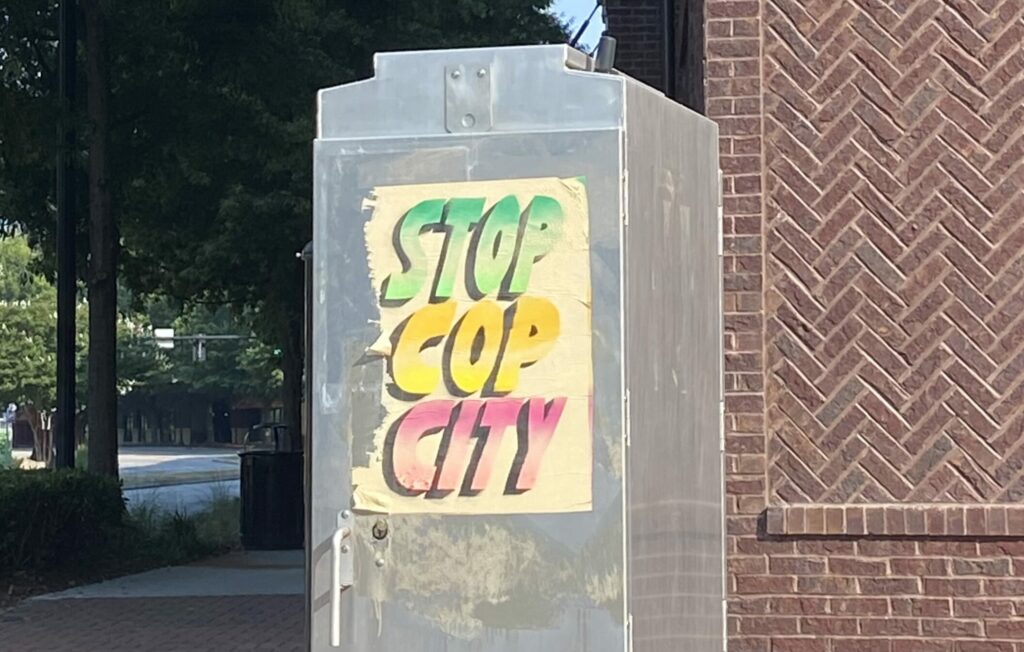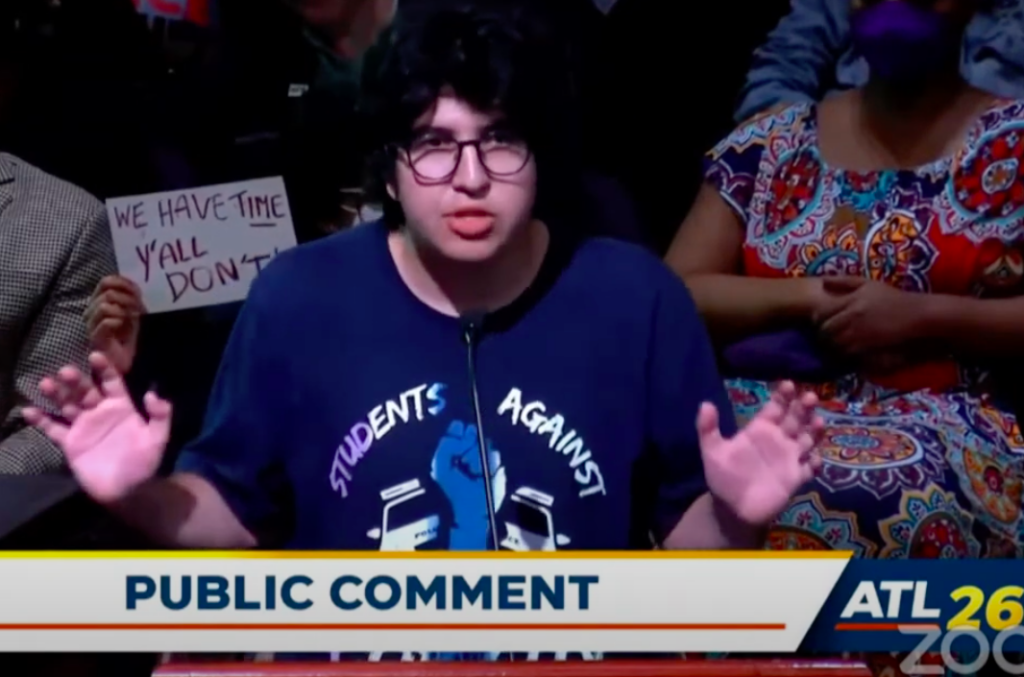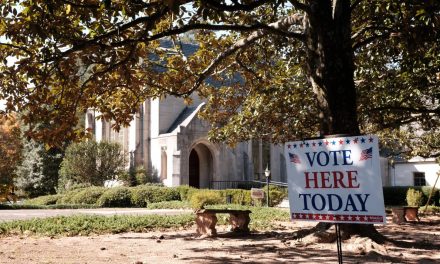Following the Atlanta City Council’s vote on June 6 to allocate $67 million to the proposed Atlanta Public Safety Training Center, some Emory University faculty, alumni and students are continuing their call on the institution to publicly denounce the project.
The project was first proposed in 2021 by former Atlanta Mayor Keisha Lance Bottoms as a way to respond to a 58% rise in homicide rates in the city in 2020. The Center would provide training for Atlanta police officers and firefighters.
Referred to as “Cop City” by its critics, the training center would sit on 85 acres of Atlanta’s South River Forest, also known by its original Muscogee (Creek) name, “Weelaunee.” These critics cite environmental concerns, as well as fears that the project will lead to over-policing in the predominately-Black neighborhoods close to the site.
The Council’s meeting began on June 5 and stretched into the early hours of June 6, as 360 people signed up to give over 14 hours of public comment on the proposed Center. Of the citizens who gave public comment, only four spoke in favor of the project.
Associate Professor of Religion Sara L. McClintock spoke at the Monday meeting. McClintock, who specializes in Buddhist philosophy, said that they tried to convey to the council members “that what we do with the land really matters.”
“We don’t want [the training center] because it doesn’t contribute to life,” McClintock told the council members. “It is not an institution of peace. It’s not a way forward for our city that we love.”
Gabriel Hirschhorn (25C) and Oren Panovka (26C) also attended the voting meeting.
Panovka said he arrived at City Hall around 9 a.m. on June 5 with other Atlanta college students and stayed until the 5:30 a.m. vote. He said the meeting was “super energizing” due to the amount of people who turned out to bear witness to the vote and provide public comment on the project.
Atlanta City Council member Mary Norwood (74C), who voted “Yes” at the June 6 meeting, told the Atlanta Journal-Constitution that the project will save the city around $200,000 annually on public safety training costs. Additionally, Council member Alex Wan, Emory’s former director of development and another “Yes” vote, told the paper that Atlanta “has a critical need” for the project.
Prior to the city council meeting, Emory community activists took multiple stands against the project and called on the University to do the same.
Students involved in the “Stop Cop City” movement led a walk-out on April 24 and four days later faculty published an open letter addressed to University President Gregory Fenves and Emory administration. Most recently, Emory alumni issued demands to the University through a petition, which garnered 481 signatures at the time of publication.
Jaanaki Radhakrishnan (26C), a “Stop Cop City” organizer who helped lead the Emory walk-out, said that Fenves’ lack of response is “really disappointing,” although “unsurprising.” They said Tuesday’s vote “doesn’t change anything” regarding the group’s desire to see the University meet their demands.
“This is an incredibly influential university,” Radhakrishnan said. “Both in terms of its financial influence and also in terms of its prestige and the fact that if Emory takes a stand … that sets a precedent and puts pressure on lots of other universities … to sort of follow suit.”

A sign posted outside the entrance to Emory Point. Critics have referred to the proposed Atlanta Public Safety Training Center as “Cop City.” (Sarah Davis/Editor-in-Chief)
Emory ties to Atlanta Committee for Progress, Atlanta Police Foundation
Fenves, along with other Atlanta university presidents, has been criticized for his board member position on the Atlanta Committee for Progress (ACP). Atlanta Mayor Andre Dickens chairs the committee, which is composed of corporate and institutional Atlanta leaders, with the stated mission to lead on “key issues important to economic growth and inclusion” for Atlanta citizens.
Under the direction of Bottoms, the Committee issued a letter of support for the training center and other “accelerated measures to reduce violent crime” on April 1, 2021.
At this year’s Commencement ceremony on May 8, Fenves awarded James Cox Kennedy an honorary Doctor of Humane Letters degree for his “unwavering commitment to improving the world.” Kennedy is the chairman emeritus of Cox Enterprises and chairman of James M. Cox Foundation, which led the private funding campaign for the proposed training center.
Adesola Thomas (20C), who watched the ceremony online, said she found Kennedy receiving this award contradictory, given his financial contribution to the Atlanta Public Safety Training Center, which she opposes.
“I’m just not not sure how building this facility will improve the city of Atlanta,” Thomas said.
Following an open letter from health care students and professionals on Feb. 5, former University President Claire Sterk resigned from her position on the Atlanta Police Foundation’s (APF) Board of Trustees. The letter also placed pressure on Department of Surgery Professor Douglas A. Murphy (83MR) to leave his position on the APF board, which he has not done.
APF is projected to provide two-thirds of the funding for the project through a loan and private fundraising and is leasing the land for the project. The training center is only one part of the nonprofit organization’s Public Safety First Campaign, which aims to “change the trajectory of public safety and serve our city for decades,” according to the Foundation’s website.
APF Vice President and Director of Public Affairs and Communications Rob Baskin said that the organization has been “acting at the behest” of the City Council to create the proposed Center.
“This notion on the part of the protesters — consistent though it may be, is consistently wrong — that this is a project of the Atlanta Police Foundation,” Baskin said. “It’s not at all. It’s a project of the City of Atlanta.”
Michel Khoury, an assistant professor in the Department of Neurology and co-director of the Georgia Human Rights Clinic, helped author the open letter to Sterk and Murphy. Khoury said he believes the APF is harmful because it “promote[s] this increase in policing and Cop City itself.”
Baskin disputed claims made by some within the “Stop Cop City” movement that the proposed project would cause environmental harm and police militarization. He cited city officials’ efforts to ensure the facility meets LEED certification standards, as well as federal and local environmental standards.
“We’re not blind to the fact that there’s a small and persistent group of people who disagree with the notion,” Baskin said. “We just frankly think their concerns are misplaced. We’re not providing a facility that’s going to militarize the police. That’s a canard; it’s just not true.”
In addition to Murphy, eight other Emory alumni are involved on the APF’s board. Josh Kamin (92C), Norman “Norm” Brothers (92L), Robert “Lee” Burrows (92B), Nathan B. Knowles (09B), Charles “Chuck” Palmer (86L) and William J. Jordan (95L) serve as APF Board of Trustees members. Leslie Patterson (99B) is a member of APF’s Emeritus Board and John Schellhase (23B) serves on APF’s Young Executives Board.
Burrows wrote in an email to the Wheel that he joined the APF after the 2020 murder of George Floyd. He wrote that he was “terribly troubled” by Floyd’s death and by other instances of unarmed Black men killed at the hands of police.
“Instead of just complaining and feeling badly, I decided to be proactive,” Burrows wrote. “That is when I reached out to a few friends to see how I could make a difference for the good of Atlanta and ultimately I became involved in the Atlanta Police Foundation.”
In particular, Burrows pointed to the APF’s At-Promise Initiative, Crime Stoppers and police community housing as some areas in which the Foundation positively contributes to the community.
“I am involved because I think policing can be made better, and in order for that to happen, police need the best training available,” Burrows wrote.
Additionally, Baskin cited the “about a dozen citywide programs” the APF created to “help reduce crime in the city and make citizens safer.”
“It’s interesting because the ethos of our organization has always been about making the police more responsive, more effective, more community-engaged than ever before and teaching, if you will, best practices and best behavior,” Baskin said. “We have a host of programs with standing track records that have been recognized, not just locally but nationally.”
The Woodruff Foundation pledged $10,000 to APF in 2022, according to the APF’s Board of Directors meeting agenda. Robert W. Woodruff, the Foundation’s namesake, attended what is today Oxford College. Since 1937, Woodruff and his foundation have made significant donations to the University.
In a statement to the Wheel, Assistant Vice President of University Communications and Marketing Laura Diamond wrote that the University is “aware” that some Emory community members “have concerns” about the project. Diamond noted that Fenves and “other leaders” have held meetings with some community members on the topic.
“Emory University does not have any official ties to the Atlanta Police Foundation,” Diamond wrote. “The safety of our community is one of our top priorities and we work with and support law enforcement agencies and local and state officials on a variety of issues, including public safety.”
Alumni pushback to the project
Some Emory alumni have come together in recent weeks to speak out against the project and University leadership’s silence.
Bria Goeller (20C) co-wrote and published a petition on May 16 with Thomas and other alumni. The authors echoed student demands by calling on their alma mater to “publicly denounce” the project and Fenves to leave his position on the ACP.
Goeller said that the letter “comes from a place of love” for Emory and Atlanta.
In addition to uplifting student demands, the letter urged that the University issue an apology to the student protestors who were asked by the Emory Police Department (EPD) to leave their April 24 demonstration on the Atlanta campus’ Quadrangle or face arrest. Students ultimately complied with the request.
Along with EPD, the Atlanta Police Department (APD) were also on the scene, which Eliza Blocker (21Ox, 23C) said felt like an “intimidation tactic.” After the incident, Diamond wrote in an email to the Wheel that the students’ tents were “not permitted.” The University has not specified which policy was violated.
Thomas said she was “incredibly startled” to hear about EPD’s actions toward the protestors.
“I have great memories of having class outside on the Quad, so to see people demonstrating in their tents in solidarity with other folks throughout the city of Atlanta and then for both EPD and APD to be called on them — I was really frightened and startled by the initial reaction,” Thomas said.
Goeller said she is hopeful that the University will meet the demands outlined in the letter.
“Emory has a complicated relationship with the city, and at times I worry about wearing an Emory sweatshirt around,” Goeller said. “I hope not to feel that one day, and I want other people to have the same experience of the Emory that I went to.”
Faculty speak out
Prior to the alumni petition, 155 faculty members signed the April 28 open letter, calling on Emory University and Emory Healthcare leaders to “publicly denounce” the project and “support” the right of its community members to protest “in the near future.”
Now, almost two months later, some faculty said they are still waiting for a response.
Pablo Palomino, an assistant professor of Latin American and Caribbean Studies at Oxford, signed the letter after it circulated on a faculty email chain. Although he admitted he did not necessarily agree with “every line,” he felt he should show his support.
“I saw that as a way to signal to the entire community, not only to Fenves … that some parts of the community do care about these issues,” Palomino said. “I feel a little bit disappointed about the … inability to set up a conversation about this.”
Associate Professor of Philosophy Dilek Huseyinzadegan and McClintock, along with another unnamed faculty member, met with Fenves and Provost and Executive Vice President for Academic Affairs Ravi Bellamkonda on June 2, four days before the city council’s vote.
During the meeting, Huseyinzadegan said that Fenves did not specify whether or not he planned to publicly address the issue. If Fenves does decide to make a public statement, Huseyinzadegan said she hopes it would be inspired by the “hours and hours of public commentary” at last week’s city council meeting.
“I would like to see a response, of at least acknowledgment, and how this proposed project is a mockery of democracy in this city and how our faculty, students, staff expertise and action can actually be useful to steer our city in a better direction,” Huseyinzadegan said. “But I don’t expect it to happen because I think he was very firm in his position that this is not for Emory to interfere in.”
Students mobilize
Students have also led the charge on placing pressure on Emory to denounce the training center. However, Panovka said that such a statement from the University would not suffice.
“Speaking out would be a bare minimum, but I think there needs to be some pretty material changes,” Panovka said. “If Fenves makes a statement and doesn’t actually do anything beyond that, then that’s performative.”

Oren Panovka (26C) addressed the Atlanta City Council at their meeting on June 5. (Courtesy 11Alive)
In particular, students have called on Fenves to step down from the ACP, which Radhakrishnan said “does not serve the interests of the Atlanta community.”
“Cop City is a really great example of that,” Radhakrishnan said. “[ACP] do[es] a lot of moral posturing in the way that most gentrifiers do a lot of moral posturing.”
In the weeks leading up to the vote, Panovka and other students in the “Stop Cop City” movement met with some of the council members. Panovka also appealed to the council members to vote against the project in his public comment at the voting meeting. He said that the resulting vote revealed where the council’s interests lie.
“City council is pretty much showing their cards,” Panovka said. “They’re showing that they’re corrupt. They’re showing that they’ve been bought out by the Atlanta Police Foundation, and that we can’t really have that much faith.”
A continued call for institutional action
In the aftermath of Tuesday’s vote, the “Vote to Stop Cop City” coalition filed a referendum petition with the Atlanta city clerk. If the petition is approved by the clerk and garners 70,703 signatures, the referendum would appear on the November ballot for Atlanta voters. McClintock said that the referendum is a way to bring “direct democracy” into this debate.
Hirschhorn urged the Emory community to “not lose faith” and encouraged campus clubs to mobilize the student vote.
“Every club that has taken up that cause now needs to put their full weight into fighting this because these next stretch of months are going to be critical, really critical, in the fight against Cop City,” Hirschhorn said.
Additionally, Radhakrishnan, who is Black, said that the movement on campus has been heavily populated by white students and encouraged community members of color to join the effort.
“There’s room for all kinds of work here and for all kinds of people, and I really think that there’s a really beautiful opportunity for some really productive creation-based work to happen,” Radhakrishnan said. “I would really encourage Emory students, particularly students of color, to take up that space.”
To many of those in the Emory community who oppose the project, last Tuesday’s vote was not an end, but rather a mobilizing force in the “Stop Cop City” movement.
“The movement on campuses across Atlanta and actually across the country, and the movement at large, is just going to continue to grow stronger,” Panovka said.
Additionally, Goeller urged the Emory community and its leaders to consider the stakes they have in the project.
“Just because you’re against Cop City doesn’t mean you’re against Atlanta, and just because you condemn Emory for not taking a stance doesn’t mean you’re against Emory,” Goeller said. “Approaching these things with a mutual investment in the community is a really important thing to highlight.”
Sarah Davis (22Ox, 24C) is a co-Editor-in-Chief of the Wheel. Previously, she interned with The Atlanta Journal-Constitution, The Covington News and Austin Monthly Magazine. In her free time, you can find her exploring new running trails and coffee shops around the city.






